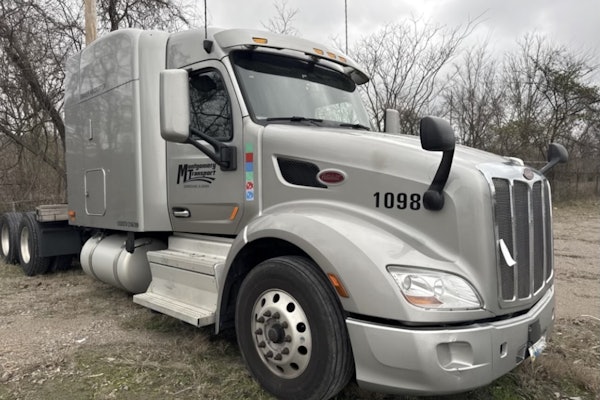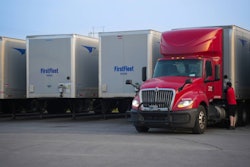Con-Way Transportation Services Inc. has formed a new operating company, Con-Way Truckload (CTL), scheduled to begin operations next year. The new company will provide linehaul service on full transcontinental loads for Con-Way’s three regional less-than-truckload carriers – Central Express, Southern Express and Western Express.
Knight Transportation has established a new subsidiary, Knight Refrigerated, which plans to begin offering temperature-controlled truckload service in the third quarter of this year. The Phoenix-based operation initially will consist of about 50 tractors.
Roadway Express has introduced Time-Advantage, a service for expedited or emergency shipments. The transporter says its new service provides shippers with more flexibility and options to meet any time-definite need as fast as next day throughout North America, by ground or air.
XRG Inc. has purchased Fletcher, N.C.-based truckload carrier Carolina Truck Connection (CTC) through the issuance of 1.2 million shares of common stock and the assumption of $470,000 in long-term debt. CTC will operate as a division of XRG Logistics and will retain its identity with the public.
U.S. Xpress has started a two-phase project that could add 1,000 jobs, mostly in office support. The company is buying 40 acres across from its headquarters in Chattanooga, Tenn., adjacent to Interstate 75, and plans to build a 50,000-square-foot office facility that would house 500 employees.
Last month, I addressed six simple steps for improving driver retention. They weren’t difficult or expensive to implement, but I’ll wager that the vast majority of fleet executives who read that column – even those with company-threatening turnover problems – haven’t implemented a single idea.
Tackling a tough problem like driver retention simply is too daunting for many carriers. Managers immediately recognize that addressing the challenge will require significant resources and may not produce results quickly or at all. Sometimes carriers implement changes expecting great rewards only to see the problem get worse. Most carrier managers are too busy putting out fires to implement change. And frankly, that’s the way they like it. They spend their days resolving problems that pop up and go home satisfied that they accomplished something.
Does this describe your current situation? If so, here are a few simple steps for implementing change.
Develop a simple plan. The best way to start any change process is to develop a solid plan that lays out what you want to accomplish, who is going to do it and when it will be done. The plan must show an understanding of your current situation and what steps will help the problem. A team of five or six people representing all areas of the company usually can put an effective plan together.
Don’t overreach. Companies often fall into the trap of scheduling too many action items for the first month. With so many things to do, nothing gets done, and the plan is quickly forgotten. A more realistic approach is to plan to accomplish one or two changes each week, making sure each change continues. Little changes will start to add up, and soon you won’t recognize the place.
Divide and conquer. Most plans tend to revolve around one person or group of people. That’s not a strategy for effective change. If the operations manager owns most action items, he likely won’t have time to accomplish them. An issue like driver retention is everyone’s job. Make sure everyone has a few action items to accomplish.
Free up resources. Getting out of firefighting mode means setting aside time to implement change. It’s difficult to complete new projects between phone calls. If you can’t free someone up for an extended period of time, try making him untouchable for at least one day a week to work on an action item. Treat that person like he is on vacation and is to be distracted only in case of emergency.
Stick with commitments. To show support for a new program, managers often offer to do numerous things. Perhaps, for example, the company president promises to have lunch with each new driver during orientation, which certainly would be a worthwhile gesture. But then he fails to follow through a couple of times and sends the signal that maybe this retention push isn’t really that important after all. Choose your commitments wisely. Only sign on to do things that you know you can accomplish week after week.
Follow up. Once you have adopted a plan, you need to make time for regular follow-up on the company’s progress relative to the plan. Gently remind people that they committed to accomplishing certain items. If an action item no longer seems important, take it off the list. Nothing is more discouraging than seeing a long list of unaccomplished tasks.
In addition, be sure to see firsthand evidence that a change has been made. Suppose an action item on driver retention is getting the tractors cleaned up for the new drivers. You need to get out in the yard to see what kind of job is being done. Then make sure you get out there every few weeks to be sure that the same level of effort is being made. People too often revert to old habits.
So stop putting out operational fires all day long. Change really isn’t that difficult once you truly commit to doing it.
EPA may delay oil spill rule
The Environmental Protection Agency last month proposed to extend for 12 months certain compliance dates for preparing and implementing spill prevention, control and countermeasure (SPCC) plans, which are required by 2002 oil pollution prevention regulations. The American Trucking Associations was among the groups that sought an extension of the compliance dates.
Under EPA’s regulation, facilities with an accumulative aboveground storage capacity of more than 1,320 gallons of oil or petroleum-based products must develop and implement plans to prevent potential spills from reaching navigable waters. EPA has generally included diesel fuel tanks greater than 55 gallons and tanker trucks in determining the 1,320-gallon threshold.
The original deadline for preparing a plan was Aug. 17, 2004, and the deadline for implementing it was Feb. 18, 2005. The proposed deadlines are one year later in each case. EPA said some affected facilities needed more time for the regulated community to undertake the actions necessary to prepare and update their plans. A blanket extension also would relieve EPA of the burden of fielding individual requests for extensions.
Facilities that started operations between Aug. 16, 2002 and Feb. 18, 2006, would have to prepare and implement an SPCC plan by Feb. 18, 2006. Affected facilities that become operational after Feb. 18, 2006, would have to prepare and implement an SPCC plan before starting operations.








